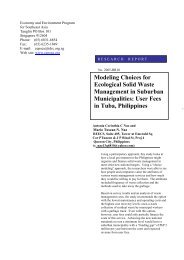systems research - the IDRC Digital Library - International ...
systems research - the IDRC Digital Library - International ...
systems research - the IDRC Digital Library - International ...
Create successful ePaper yourself
Turn your PDF publications into a flip-book with our unique Google optimized e-Paper software.
Decentralization and farming <strong>systems</strong> <strong>research</strong><br />
In most countries represented at <strong>the</strong> workshop, several shifts have occurred in<br />
<strong>research</strong> and development. First, by <strong>the</strong> late 1980s, <strong>the</strong> allocation and use of<br />
national resources became a dominant <strong>the</strong>me in <strong>research</strong> and development<br />
throughout <strong>the</strong> region. Ra<strong>the</strong>r than focus on comniodities per se, more attention<br />
was devoted to adaptive <strong>research</strong> in specific agroecological areas. This shift was<br />
accompanied by agroecological zoning and <strong>the</strong> creation of regional <strong>research</strong><br />
institutes, each with a specific mandate.<br />
Although this points to a form of decentralization, it should not be forgotten<br />
that in most countries this process was accompanied by a considerably streng<strong>the</strong>ned<br />
role for coordinating institutes and <strong>the</strong> creation of national apex agencies that were<br />
responsible for planning, budget allocation, and donor re1:ltions. This was <strong>the</strong><br />
second major shift.<br />
Decentralization and regional specialization of <strong>research</strong> into specific areas<br />
provided significant institutional opportunity for FSR. This is reflected in <strong>the</strong><br />
emergence of loosely structured FSR networks (e.g., in Vietnam) ;ind more<br />
formalized <strong>systems</strong> (e.g., in Thailand). An encouraging feature of this development<br />
is that government institutes, nongovernment organizations, and universities<br />
participate in <strong>the</strong>se networks and <strong>systems</strong>. Although <strong>the</strong>se structlires tend to emerge<br />
In response to somewhat inflexible government procedures, it is not unthinkable<br />
that such approaches, creative as <strong>the</strong>y are, could hinder long-term interest in <strong>the</strong><br />
practice of FSR because <strong>the</strong>y reduce <strong>the</strong> short-term need to properly institute<br />
programs.<br />
The situation in <strong>the</strong> region, however, is not uniform. In severai countries,<br />
FSR has become part and parcel of outreach institutes and even central <strong>research</strong><br />
agencies (e.g., in Indonesia and Sri Lanka). The success reported in <strong>the</strong> Indonesian<br />
case relates clearly to <strong>the</strong> existence of a well-defined FSR program and <strong>the</strong><br />
willingness of senior officials to take FSR activities seriously. However, a possible<br />
drawback could be that this FSR would be subject to national targets and plans,<br />
which \vould not automatically be beneficial to effective FSR. In view of <strong>the</strong><br />
variability in <strong>the</strong> organizational structure of <strong>research</strong> and development in <strong>the</strong> region,<br />
it is not possible to make sweeping statements and present firm conclusions. It is,<br />
for example, not :lt all certain that <strong>the</strong> prevalent shift to rewurce rn:inagement will<br />
indeed lead to more efficient use of resources and expanded private and social<br />
benefits. At <strong>the</strong> same time, <strong>the</strong> reduced emphasis on long-term, commodity-focused<br />
programs may hamper <strong>the</strong> creation of basic technology. Whatever ~ilill happen, it is<br />
to be foreseen that <strong>the</strong> resource-focused drive will continuz because of <strong>the</strong><br />
increased importance that society gives to environmental factors.
















